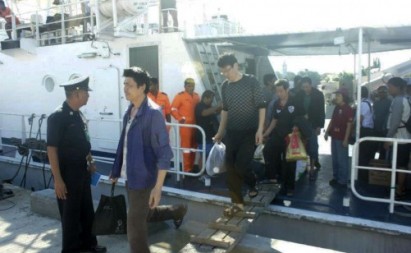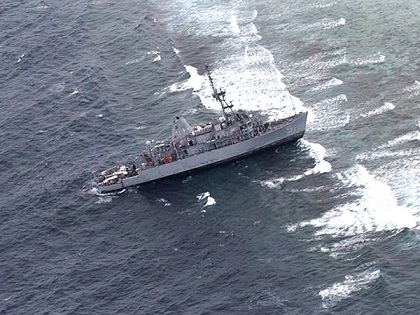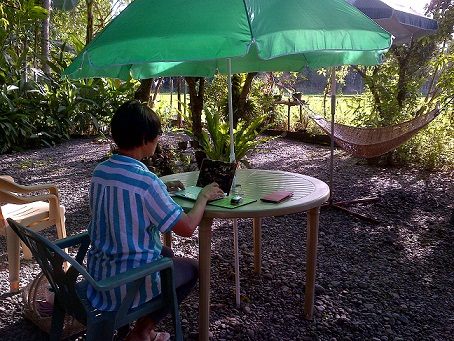President Aquino is being consistent when he said that the government will not be filing a diplomatic protest against China for the intrusion of a fishing vessel that got stuck in Tubbataha Reef in Sulu Sea, 150 kilometers southeast of Puerto Princesa City in Palawan.
After all, he didn’t also protest to the United States when the minesweeper USS Guardian got stuck and caused extensive damage to the reef which is Marine Protected Area three months ago (Jan. 17). It took the US navy three months remove the 1,300-ton, 68-meter-long Avenger Class minesweeper piece by piece. It was completed last March 30.
Deputy presidential spokesperson Abigail Valte said April 7 that a diplomatic protest against the U.S was “unnecessary” because the superpower has been cooperating with the maritime investigation and has committed to the compensation and rehabilitation of the reef.
Damaged to Tubbataha Reef, which is UNESCO Heritage site, has been placed at P58 million.
Despite a Visiting Forces Agreement between the U.S. and the Philippines which provides the guidelines on the prosecution of any member of the U.S. armed forces who violates Philippine laws, the commander of USS Guardian, , Lt. Cmdr. Mark Rice, was not charged in Philippine Court nor any one of his 79-man crew.
Rice and his crew were re-assigned to USS Warrior. A news report quoted Rice saying,” All 79 Guardian Sailors made it home …” He praised his men for the “courage and dedication” they showed when USS Guardian ran aground.Rice blamed faulty map for straying into the prohibited area.
For a fleeting moment , on Jan. 26, a week after the incident, Aquino talked about enforcing Philippine laws on the Americans. In an interview on the sidelines of the World Economic Forum in Davos, Switzerland, Aquino said, “Our laws are very specific. When they got the diplomatic clearance to pass through our waters, this is a recognized, internationally recognized zone, that is, like an exclusive zone. They violated it. There are penalties.”
Republic Act 10067 establishing the Tubbataha Reefs natural park in Palawan as a protected area prohibits the entry to Tubbataha Reef without the permission of the Tubbataha Protected Area Management Board.
The law says violators will be penalized with a jail term of up to one year and a fine ranging from P100,000 to P300,000.
It’s the same law that Aquino wants to be strictly applied to the 12 Chinese fishermen, whose boat, Ming Long Yu, got stuck in Tubbataha almost midnight of April 8.
Maybe it’s a coincidence but last Monday marked one year that Chinese fishing boats were apprehended in Bajo de Masinloc also known as Scarborough Shoal (the Chinese refer to it as Huangyan island) which triggered a two-month standoff and finally led to the filing by the Philippines of a petition against China with the United Nations Arbitral Court.
News reports said Aquino was upset by the report of Chinese intrusion in Tubbataha Reef. He was in Roxas City for the groundbreaking of the Capiz airport. “”Ang bottom line d’yan, merong tayong batas, Republic Act 10067, that states everything that needs to be known. ‘Pag pumasok ka within this zone, may presumption na agad na poaching ‘yung pakay mo. May kaukulang penalties, may imprisonment, may fine. Our job as the Executive department is to execute the law,” he said.
As ordered by the President, charges of poaching and other violations were immediately filed against the Chinese fishermen.
Adelle Villena of the Palawan Council for Sustainable Development said the fishermen will also be charged with bribery for allegedly offering the Rangers guarding the protected site with $2,400 when their boat ran aground.
The Chinese fishermen are really in trouble because Philippine Navy sources said materials they confiscated from the boat make them believe that the 12 were not really fishermen. “If you look at those guys, they do not have the sturdy physique and complexion of fishermen, “Navy sources said.
See, Philippine officials know their law and how to execute it if they want to. They also know which group of people to apply the law and which group are exempted from the law.





